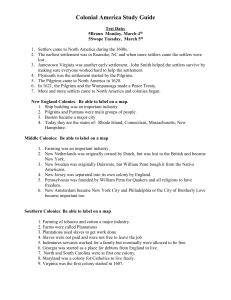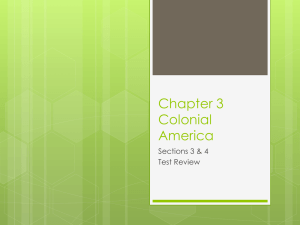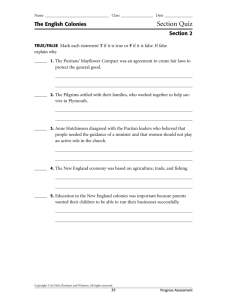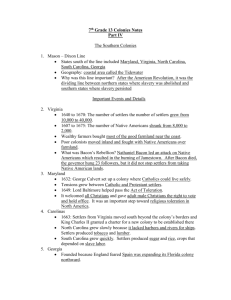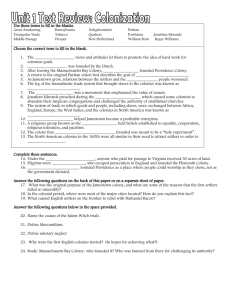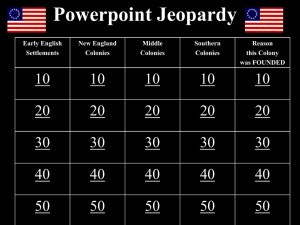English Colonization, Part 2: New England Colonies
advertisement
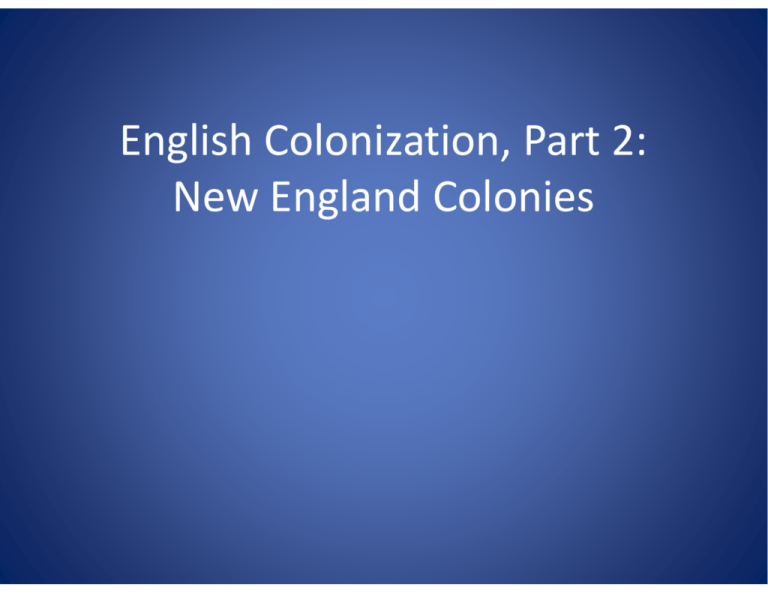
English Colonization, Part 2: New England Colonies Differences in Colonizing • The New England colonies were very different from the Chesapeake colonies from the very beginning… – The New England colonies were established for the purpose of religious freedom, not profit – New England settlers were middle class whole families, not upper class gentlemen or indentured servants A Better Environment • The New England region offered a much more hospitable environment for settlers – The climate was not as volatile and the region was not susceptible to insects and disease • Whole family units offered a greater chance of survival • The life expectancy of settlers in the New England colonies was comparable to today (70+ years) – In comparison, the life expectancy in the Chesapeake region was around 40 years The First Settlers of New England • The Separatists were a religious group of England who wanted to reform the Church of England, and who believed the best way to do this was by separating from the Church – Pilgrims – wanted a complete separation from the Church of England – Puritans – wanted to move away from the Church of England and make a new example for it to follow The Pilgrims Begin Their Journey… • In 1607 a group of Pilgrims fled England and moved to Holland – After a while the Pilgrims longed to return to English ways, but they knew they would not be welcomed back to England – The next best thing was to move to the New World of the of the English colonies – In 1619 they were granted the right to move to the Virginia territory Establishing Plymouth • The Pilgrims would be blown north off-course and in 1620 they landed in Cape Cod and established the colony of Plymouth – They had no legal right to this land, but they would later receive a royal charter • Mayflower Compact – Before going ashore the men of The Mayflower agreed that their government would be based upon democratic, majority rule • For decades Plymouth was dominated by William Bradford, a fair and very religious leader who served as governor for over 30 years Early Years of Plymouth • Though times were tough the early settlers of Plymouth were able to survive – They were helped by Native Americans who taught them to farm crops like corn, to fish, and to also use fish for fertilizer • By 1621 the settlers had stored enough crops to survive the winter seasons – Squanto – and English-speaking Native (he had earlier been kidnapped by English settlers) who greatly helped the Plymouth settlers in the early years Plymouth • The Plymouth colony would never be force in the New World – Many were turned off by its very strict social and religious codes • In 1691, the year in which the colony would be absorbed by Massachusetts Bay, there were only 7,000 settlers in its territory Another New England Colony • A group of Puritans who did not want to live in Pilgrim Plymouth received their own charter for a colony in 1629 – It was a joint stock charter for the Massachusetts Bay Company – The charter itself was unique in that there was an error in its making; usually there was a clause in charters that stated that the home office had to be in England; this was accidentally left out of the MA charter so the settlers were able to bring their charter with them and therefore be self-governing A Successful Colony from the Beginning • Within the first year over 1,000 settlers would populate MA Bay – This obviously held many advantages for the colony • Whole middle class families made the journey together • Whole towns were uprooted from England, meaning that all necessary trades for a colony’s survival (metal smiths, cobblers, millers, etc.) were found in the colony Massachusetts Bay • John Winthrop – Was the leader of the establishing of MA Bay, he served in the governor’s role for 19 years – Was a very capable leader and lawyer • His legal skills protected the early colony from political attacks from England in its early history – Was a devout religious leader as well • Was famous for stating that MA “would be as a city upon a hill”… meaning that the colony would set such a wonderful example for all Christians that all would follow its lead… Early Massachusetts Government • Though Winthrop would dominate the MA Bay government throughout its formative years, there were some significant democratic developments – Within the first 14 years the colony’s government would evolve from a court of appointed officials to a bicameral general assembly with elected officials – All male members of the church were allowed to participate in government The Great English Migration • The establishment of MA would touch off a decade of migration from the country of England to its colonies • From 1630-1640 over 80,000 English would leave the mother country for its colonies – Most were headed for the Chesapeake and Southern colonies, but 25,000 of them did arrive in MA Bay Disagreements and New Colonies • Though the Puritans themselves were fleeing religious persecution, they themselves were not tolerant of other religious ideas • Most of the other New England colonies would be formed by those not agreeing with the dominant Puritan beliefs Rhode Island • In 1636 Roger Williams was banished from MA Bay for disagreeing with religious and political leaders on a number of issues – He believed that God was to be found within each person, not within the church – He advocated a complete separation of church and state – He believed it was wrong to take advantage of Native Americans by taking their lands “The Waste Can of the Colonies”… • With his family and a number of his followers Williams settled with the Narrangasett Indians and established Providence, the first settlement of Rhode Island • He allowed for complete religious toleration and formed a government completely separate from the church – The colony would quickly come to be viewed by the others as the ‘waste can’ for anyone who could not fit into proper society A Woman Rebel… • Anne Hutchison – Was unique in her time for the simple fact she was a female religious leader in a male-dominated society – Preached the belief of antinomialism (if God has already determined who is saved and who is not then man is not subject to man or God’s laws) – Was banished from MA Bay and fled to Rhode Island • She would later move to New Amsterdam where she and her family were killed by Native Americans – Winthrop and MA saw this as a sign from God that they were correct in banishing her Connecticut • In 1636 Thomas Hooker led three whole congregations from MA to settle three new river towns in what would become Connecticut • The Fundamental Orders of Connecticut – Were established in 1639 and established a representative government open to all property owning males, not just church members Maine and New Hampshire • The first settlements north of MA began in the 1630’s under lands granted to Sir Fernandino Gorges (Maine) and Captain John Mason (New Hampshire) • These lands and settlements would later be claimed by MA, but court settlements would later establish the colonies of Maine and New Hampshire Hostilities with Native Americans • Mistrust grew between settlers and Natives, mainly over land disputes • The Pequot War, 1636-38 – The New England colonies would form an alliance with the Narrangasett tribes – They would attack the Pequot tribes, a powerful force in the Connecticut and MA regions – By 1638 the Pequot peoples were virtually wiped out King Philip’s War • Though the peace following the Pequot War would last for a number of decades, by 1675 King Philip (Metacom) had formed the New England tribes into a cohesive alliance • In 1675 King Philip launched a full-scale attack against all white settlers of the region • The New England colonists were pushed all the way back to Boston and a large portion of the entire population was killed • The Natives could not hold up the attack and, due to a lack of supplies and devastation from disease, the resistance was crippled and the Natives were pushed permanently from the region
